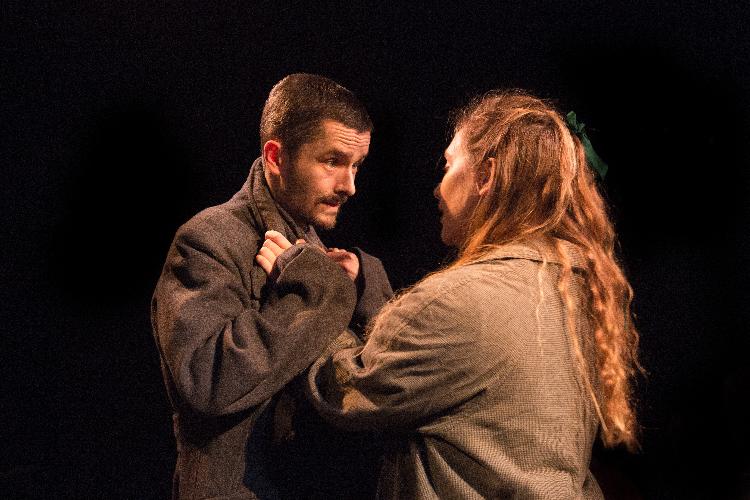Fraser Grace’s Bliss follows the story of childhood sweethearts Lyuba - played by Bess Roche - and Nikita - played by Jesse Rutherford - in the remnants of the conflict. Despite the previous connection they shared, the harsh conditions of survival and the consequences of the conflict have left something severely damaged.
Menagerie Theatre Company’s production of Bliss is a magnetic play based on a 1939 short story from Andrey Platonov. Stalin hated Platonov – labelling him ‘scum’ – for portraying the truth of human experience under an authoritarian regime. So, how the story survived to reach a contemporary audience is beyond impressive!
Paul Bourne’s production is reminiscent of ‘Half a Sixpence’ meets the design of Southwark Playhouse’s ‘Curious Case of Benjamin Button’ – without the musical glam. Bourne’s design is a wholesome staging, recreating the poverty and bare emptiness left behind for people to struggle through. The stripped-down simplicity of the wooden crates is versatile for encouraging a harsh imagination of the various images from a market town to a lonely house by a river. Further visceral response is elicited from Michaela Polakova’s composition and sound design with a constant reminder of the tenderness the couple once shared before being left with nothing.
Rutherford is well cast in the prominent role of the war-torn Nikita Firsov. Their attempts of affection are well-placed as they try to permit tenderness despite the clear emotional scars. Similarly, Roche’s Lyuba finds a heart-wrenching desperation for the love they deserve. Roche is wrapped into the world of the play down to the detail of their little finger quivering when attempting to find a little light in the broken comrade. The couple are a broken record with no end in sight. This could be interpreted as a mismatched chemistry perhaps, but it also lends itself to the reality of the desperate times.
The couple are encouraged to find their hope by Nikita’s father Mikhail – played by Patrick Morris. Morris finds a cheery and odd-ball father figure, just as corrupted by the war like the others and real moments of tenderness between father and son give a well-rounded understanding of the consequences – Mikhail’s desperation for physical contact with Nikita to remember some affection is more powerful an action than any soliloquy.
Bourne’s detail in direction is captivating. From the dust on Nikita’s jacket rising as it is dislodged to the precision with which the Tramp – played by Jeremy Killick – finds their space within the chaos, every detail has been curated to accompany the intimacy of the Finborough Theatre’s design.
It runs until 11 June.
Review: Sebastian Calver Photo: Jack Sain

